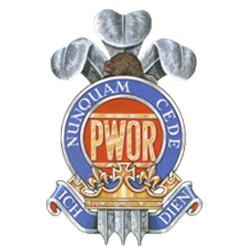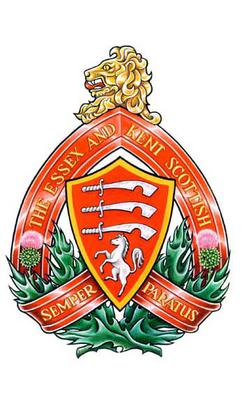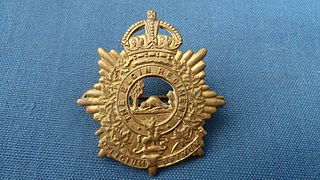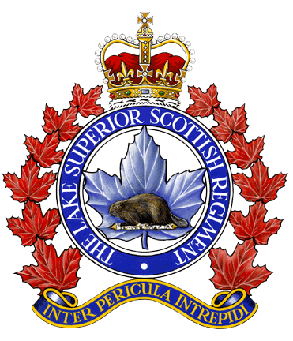
The Queen's Own Rifles of Canada is a Primary Reserve regiment of the Canadian Armed Forces, based in Toronto. The regiment is part of 4th Canadian Division's 32 Canadian Brigade Group. It is the only reserve regiment in Canada to currently have a parachute role. The regiment consists of the reserve battalion, the Regimental Association, and the Regimental Band and Bugles. The official abbreviation is The QOR of C, but the name is often abbreviated to QOR.

The Royal Hamilton Light Infantry (Wentworth Regiment) (RHLI) is a Primary Reserve infantry regiment of the Canadian Army, based at John Weir Foote VC Armoury in Hamilton, Ontario. The RHLI is part of 31 Canadian Brigade Group, which is part of 4th Canadian Division.

The Princess of Wales' Own Regiment (PWOR) is a Primary Reserve infantry regiment of the Canadian Army.

The Essex and Kent Scottish is a Primary Reserve infantry regiment of the Canadian Army.
The Essex Scottish was an infantry regiment of the Canadian Army until 1954.
The Kent Regiment was an infantry regiment of the Canadian Army from 1901 to 1954. In 1954 it was amalgamated with The Essex Scottish Regiment to form The Essex and Kent Scottish Regiment.

The 20th Battalion, CEF was a unit of the First World War Canadian Expeditionary Force.
The 182nd Battalion, CEF was a unit in the Canadian Expeditionary Force during the First World War. Based in Whitby, Ontario, the unit began recruiting during the winter of 1915/16 in Ontario County, Ontario. After sailing to England in May 1917, the battalion was either absorbed into the 18th Reserve Battalion or into the 3rd Canadian Reserve Battalion. The 182nd Battalion, CEF had one Officer Commanding: Lieut-Col. A. A. Cockburn.
The 120th Battalion, CEF was a unit in the Canadian Expeditionary Force during the First World War. Based in Hamilton, Ontario, the unit began recruiting in late 1915 in that city and parts of Wentworth County. After sailing to England in August 1916, the battalion was absorbed into the 2nd Reserve Battalion, CEF on January 20, 1917. The 120th Battalion, CEF had one Officer Commanding: Lieut-Col. George Douglas Fearman.
The 123rd Battalion, Royal Grenadiers, CEF was a unit in the Canadian Expeditionary Force during the First World War. Based in Toronto, Ontario, they began recruiting in November 1915. After arriving in England, they continued to train as an infantry battalion for several months, but just before mobilizing to France in January 1917, the battalion was redesignated the 123rd Pioneer Battalion, Royal Grenadiers, CEF.

The 133rd Battalion, CEF was a unit in the Canadian Expeditionary Force during the First World War.
The 164th Battalion, CEF, was a unit in the Canadian Expeditionary Force during the First World War. Based in Orangeville, Ontario, the unit began recruiting in late 1915 in Halton and Dufferin Counties.
The 215th Battalion, CEF was a unit in the Canadian Expeditionary Force during the First World War.

The Queen's York Rangers (RCAC) is a Canadian Army Primary Reserve Royal Canadian Armoured Corps regiment based in Toronto and Aurora. The regiment is part of 4th Canadian Division's 32 Canadian Brigade Group. The regiment consists of one cavalry squadron, as well as the Headquarters and Training Squadron. The regimental family also includes The Queen's York Rangers Band (volunteer), along with two Royal Canadian Army Cadet corps and a Royal Canadian Air Cadet squadron. The unit mottos are pristinae virtutis memor – 'remembering their glories in former days' – and celer et audax – 'swift and bold'. Among its own members and those of other regiments, the unit is referred to as the Rangers. The name is abbreviated as QY Rang, and sometimes pronounced KWY-rang.
The 241st Battalion, CEF was a unit in the Canadian Expeditionary Force during the First World War. Based in Windsor, Ontario, the unit began recruiting in the spring of 1916 in Essex County. After sailing to England in May 1917, the battalion was absorbed into the 5th and 12th Reserve Battalions in June, 1917. The 241st Battalion, CEF had one Officer Commanding: Lieut-Col. W. L. McGregor.

31 Combat Engineer Regiment , is a combat engineer regiment of the Canadian Military Engineers. It is part of 31 Canadian Brigade Group of the 4th Canadian Division. It consists of two squadrons: 48 Engineer Squadron in Waterloo, Ontario, and 7 Engineer Squadron in St. Thomas, Ontario.

The Lake Superior Scottish Regiment is a Primary Reserve infantry regiment of the Canadian Forces. The regiment is located in Thunder Bay, Ontario, and is part of the 3rd Canadian Division's 38 Canadian Brigade Group. Also known as "The Lake Sups" (pronounced soups), the regiment was active during the First and Second World Wars. During the latter, the regiment, then known as The Lake Superior Regiment or LSR, mobilized a motorized infantry battalion for the 4th Canadian (Armoured) Division; The Lake Superior Regiment (Motor) or LSR(M).
The 18th Battalion, CEF, was an infantry battalion of the Canadian Expeditionary Force in the Great War.

The 95th Battalion, CEF, was an infantry battalion of the Great War Canadian Expeditionary Force. It was formed in December 1915, and trained at Shorncliffe Army Camp in Kent. It did not see combat as an independent unit; its soldiers were used to reinforce other Canadian units in the field in Belgium and France. The 95th was disbanded in July 1917.
The 42nd Field Artillery Regiment, RCA is a Canadian Army Reserve artillery regiment based in Pembroke, Ontario. It is part of the 4th Canadian Division's 33 Canadian Brigade Group.










